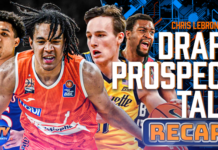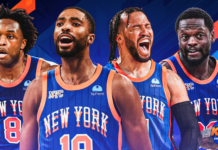The New York Knicks lost to the Los Angeles Lakers 115-122. The Knicks lose to the Lakers in another overtime battle in Los Angeles.
Catch the full Knicks Fan TV Postgame show on all major podcast platforms below:
• Spotify
• Apple Podcasts
• Google Podcasts
• Stitcher
The New York Knicks lost their road-trip opener in overtime to the Los Angeles Lakers by a score of 115 to 122. The Knicks played the part of Dr. Jekyll and Mr. Hyde, leading by as many as 21 points in one of their best first halves of the season. RJ Barrett and Julius Randle both surpassed twenty points before the third quarter began, propelled by incredible ball movement.
But even before the second quarter finished, the Lakers began to chip away at the lead. A third-quarter explosion from Malik Monk pushed LA into a lead that carried through most of the second half. RJ Barrett saved his best for the close of regulation to force overtime. But the Lakers took over in the extra minutes as New York failed to close strong.
Barrett and Randle were the stars, but their supporting cast left much to be desired. Let’s take a look at the triumphs and struggles of each player to see how this lead evaporated, turning a feel-good win into another tough defeat.
Gems from Barrett and Randle for the Knicks starters
Kemba Walker: 7 PTS (3/7 FG, 1/4 3PT), 3 AST, 1 REB, 1 STL, 1 TO in 24 mins
Kemba Walker broke his scoreless streak with a three-ball in the first quarter. That would be his only three for the game, though he would hit a transition jumper with a foot just touching the line. Walker’s offense came around some for this action, but that isn’t saying much. He hasn’t found his rhythm in an offense that emphasized Barrett’s and Randle’s touches.
Walker managed a few nice passes to go along with his field goals. When the Lakers increased their switching for the second-half, Kemba blew by a big man for a lay-up and then beat mismatches to open passing lanes. The problem is that these moments came few and far between. Walker’s production over 24 minutes wasn’t enough for sustained gravity or momentum.
I’m confused with where we’re at in the Kemba Walker experiment. He’s predominantly playing off the ball where IQ or Burks would be much more comfortable. Even as he made a few shots and assists, it felt like Walker got too much time for his limited impact. He doesn’t provide enough defensively to take a backseat in the offense and still cover for his defensive weaknesses. Walker gets a 1.5 out of 5 on his impact score, for another limited performance despite an increase in playing time.
Evan Fournier: 15 PTS (5/14 FG, 3/10 3PT, 2/3 FT), 3 AST, 4 REB, 1 STL, 2 TO in 37 mins
This was one of those games that Evan Fournier has once in a while. He came out the gate firing, notching a pair of three-pointers in the and getting inside for a nice quick finish. But Fournier’s offense would fade from there, as he missed important looks in the fourth quarter and overtime. His scoring didn’t come to a complete halt, but his efficiency collapsed after the first.
Fournier’s missed shots weren’t the only issue in crunch time. He saved a ball that would have been out of bounds on the Lakers, and instead tossed the rock right into Lebron James’ hands for an easy dunk. The play felt indicative of his night, trying hard to have an impact but not making the smartest choices. Fournier’s hustle wasn’t the problem, but his decision-making was poor.
Fournier’s defense also showed up in the worst way possible. He gave up 17 points to Malik Monk in the third quarter, sparking the wing for a huge second half. This was a Murphy’s Law type of game for New York’s new wing; anything that could go wrong did just that. Fournier’s better than this performance, but these types of games happen often enough to stand out. The French wing gets a 1.5 out of 5 on impact for struggling after the first.
RJ Barrett: 36 PTS (13/28 FG, 4/10 3PT, 6/9 FT), 5 AST, 8 REB, 1 STL, 3 TO in 50 mins
RJ Barrett book-ended this game with three-pointers and finishes in the lane that looked dominant. He hit a Dream shake on Russell Westbrook, spun off Stanley Johnson, and dunked on Anthony Davis for highlight-reel finishes. His jumper fell along the perimeter, though his few attempts at midrange weren’t as successful. Barrett was a force with the ball in his hands from start to finish and closed regulation with the final five points to force overtime.
An understated aspect of RJ Barrett’s quality performance is his defense on Lebron. Bron played everywhere from small forward to center, so defending him wasn’t the job of any single player. But when RJ got the assignment, I felt he matched with James best of any Knick. He stayed in front of the league’s best player and forced him to make tough shots (which he still made). Barrett embraced the difficult assignment.
Barrett did run into some lulls in his momentum, seeing less success when he fished for whistles against contact. He was at his best either powering through or making reads for other players when the Lakers got physical. His worst touches came when he threw up bad shots in hopes of drawing whistles. But it’s a small gripe from an otherwise huge game for Barrett while matched against some of the best players alive. RJ Barrett picks up a 4.5 out of 5 for flirting with forty.
Julius Randle: 32 PTS (11/22 FG, 2/4 3PT, 8/10 FT), 7 AST, 16 REB, 2 BLK, 5 TO in 41 mins
The upward trajectory of Julius Randle’s performances continued in LA. Forget about the fact that his jumper was falling, his rebounding was better than his already impressive norms, and his assist numbers picked back up. Just focus on his effort to sprint back on defense and push the pace on offense. The improvements he shows on the scoresheet are helped along by the fact that his energy and effort have increased.
Enough forgetting the fun stuff, let’s get into it. Randle’s best performances come when he gobbles up defensive boards and pushes the pace behind them. But pushing the pace doesn’t just mean taking the ball coast to coast. Randle frequently grabbed the board, pushed it to around half court, and then fed players breaking in front of him. It’s another example where making simple choice boosts his impact and helps limit his mistakes.
Randle also spent chunks of this game guarding one of Lebron James or Anthony Davis. Those are two of the toughest match-ups in basketball, and Randle took on both challenges. He still flashed some defensive warts, namely a failure to close out hard on guys like Trevor Ariza. But this game was the result of a couple of weeks of adjusting and showing subtle changes to Randle’s approach. I hope that it continues! Randle gets a 4 out of 5 on impact, losing a notch because he turned the ball over too much.
Mitchell Robinson: 4 PTS (2/4 FG, 0/1 FT), 11 REB, 3 STL in 30 mins
I didn’t feel like Mitchell Robinson played thirty minutes in this game. There are two reasons for that, the first of which being that Knick ball-handlers failed to feed him inside. Randle tried a lob that was way too high, and Barrett threw an entry pass into too much traffic. But for the most part, Robinson had to fend for himself, grabbing offense boards to get anything resembling a field goal attempt. He was under-utilized on offense, perhaps a testament to Anthony Davis.
The other reason that it felt like Mitch played fewer minutes, was how visible it was whenever he left the floor. Anthony Davis feasted on most other players to guard him. But Mitch kept the star player locked in battles for position most of the night. Robinson frequently broke up attempts to feed the ball to cutters, replacing his usual blocks with a series of steals. Robinson’s defense was great in this game, and any time he left the floor there was a clear shift in the quality of New York’s defensive play.
That makes Robinson’s impact a bit tough to place. He was fantastic defensively and underused by the offense. But his production is forgettable as a result of the limited touches. Robinson had a tangible impact whenever he was around the ball. It makes me wonder if the Knicks should work harder to get him more looks. Mitch has a gravity that few other players can command, and it feels like New York forgets to take advantage of it. Robinson gets a 3 out of 5 for his defensive stamp on this game.
Tough night for New York’s second unit
Immanuel Quickley: 0 PTS (0/1 FG), 1 AST in 5 mins
I won’t linger too long on Immanuel Quickley’s tough night. He came into the game and promptly got cooked by Austin Reaves to the tune of some scores, three fouls, and one poor shot choice. The problem is that this all happened in about five minutes, which isn’t enough to evaluate anybody.
Was the performance off to a bad start? Absolutely, it was a perfect excuse for Thibodeau to give extra minutes to struggling Kemba Walker and Alec Burks. But that doesn’t mean it wasn’t more of an excuse than truly justified. IQ’s play in recent weeks should have earned more rope and opportunities to bounce back. But it didn’t, because Tom Thibodeau works in mysterious ways.
As you scroll through the rest of the second unit’s numbers, bear in mind that Thibs benched the best playmaker that unit has had since Derrick Rose had surgery.
Quentin Grimes: 0 PTS (0/5 FG, 0/4 3PT), 4 REB in 15 mins
I won’t blame Quentin Grimes’ shooting woes on lack of a point guard. Grimes got two wide-open shots from the corners and failed to cash them in. His lone attempt inside the arc was a lay-up that he rushed and missed. Scatter between those good looks were a pair of shots that he took against decent closeouts. None of it went in, as Grimes simply struggled with his jump shot.
On the bright side, Grimes didn’t let that take away from his defensive energy. Instead, it was the refs that sapped some of his impact there. If you want to make the case that this game was reffed in a one-sided manner, take a glance at the calls against Grimes and compare them to the non-calls from RJ Barrett’s worst misses of the night. Grimes defended with gusto, but he was held back by foul calls.
The struggling jumper and foul calls from the refs meant that Grimes had a shorter night than normal. He logged just fifteen minutes with very little on the box score to hang his hat on. That said, I like most of the shots he took and wasn’t mad at him for the effort. The rookie simply looked like a rookie for a change. Grimes gets a 1 out of 5 for lack of production, but he’s earned a pass for this outlier.
Alec Burks: 12 PTS (2/7 FG, 1/4 3PT, 7/8 FT), 4 AST, 6 REB, 1 STL, 1 BLK, 2 TO in 30 mins
Immanuel Quickley’s foul trouble meant extended time for Alec Burks in the first half. Then Tom Thibodeau decided to just stick with Burks running the second unit. The results weren’t great with the bench scoring 19 points on 5/23 from the field combined. But to Burks’ credit, he scored the lion’s share of points for the unit.
The problem with Burks’ twelve points in just seven attempts comes when we examine how he got his points. He once again shot poorly from the field and from three. The surprise backup point relied on free throws to generate offense rather than creating within the flow of the game. That may explain the poor shooting numbers from his bigs, aka the players you expect to be most efficient.
But I don’t want to come down too harshly on Burks. He scored, created for others, grabbed boards, and played respectable defense. Alec Burks showed up to play and did his best to contribute; he was simply placed in a role that didn’t make the best use of his playstyle. So Burks had a decent game but failed to live up to the playmaking role he’d been shifted to. Burks gets a 2 out of 5 for a nice game with muted impact.
Obi Toppin: 4 PTS (2/7 FG, 0/2 3PT, 0/2 FT), 5 REB in 12 mins
The ball found Obi Toppin often enough to have better numbers than he finished with. The problem is that Toppin’s touches came almost entirely along the perimeter. He didn’t get the transition looks or lobs into the paint that we’ve become accustomed to. Instead, Obi was catching the ball to either shoot or swing another pass to the next ball-handler.
The results were an inevitably early trip to the bench and my nightly complaint that this kid needs extra time to show us what he’s got. In this case, however, I can understand why Thibodeau went with other players. Toppin’s 12 minutes fall short of an impact grade. They remind us that his jumper is the biggest obstacle blocking him from more time on the floor.
Nerlens Noel: 5 PTS (1/3 FG, 3/3 FT), 1 AST, 1 REB, 1 STL, 1 BLK, 1 TO in 23 mins
There was a sequence in the second quarter that I think warped Tom Thibodeau’s evaluation of his performance. Noel poked a ball loose to spark a transition dunk for Randle. Then the Lakers tried to respond quickly and broke the opposite way, only for Noel to swat the ensuing attempt at the rim. It was a play that screamed “momentum” and really helped Noel to stand out and earn some extra time. Check this action out…
But one highlight doesn’t tell us much about overall performance. Because I’d classify this as a poor performance for Noel. Sure he had his typical moments of disrupting ball-handlers before they could dribble to their spots on the floor. But Noel also looked outsized and outmatched virtually every time he locked horns with Anthony Davis. Davis had his way with that match-up and left Noel as the only Knick with a negative plus/minus in the double digits despite just 23 minutes of play.
I hate to be harsh on a guy that played hard as Noel did. This wasn’t an issue of poor effort or bad decisions. Noel tried his hardest and just ran into a mismatch. But the fact remains, that his struggles left me frequently glancing at the scorer’s table in hopes Mitchell Robinson would check in soon. Noel gets a 1 out of 5 for being outclassed and getting way too much time in that situation.
Bizarre rotation choices mar Tom Thibodeau’s game:
Tom Thibodeau:
With the second unit struggling as much as it did, we have to hone in on a couple of Tom Thibodeau’s rotation choices as we evaluate his performance. Two of the worst on/off splits for the entire team were Nerlens Noel and Alec Burks, but they played the most minutes of any player off the bench. That’s tough to overlook with Immanuel Quickley and Obi Toppin benched early despite having the potential to fill in for their struggling counterparts.
I levy that complaint while understanding that some of this was completely out of the coach’s hands. His offense generated wide-open looks for Walker, Fournier, Grimes, and Toppin but none of them shot well after the first quarter. Free throws could have put this game to bed early, but we knew it wouldn’t happen because the Knicks have been awful at the line. Thibs faces an uphill battle in some ways, but in recent losses, his decisions have only served to make things tougher.
It’s hard to place the blame on the coach or players when so much is going wrong. The players are inconsistent which means that the coach is constantly left searching for today’s hot hand. That said, his searches tend to fall on the same players and he’ll leave those guys out struggling instead of quickly trying the next man up. The opposite can be true of his younger players, who face accountability that’s borderline unreasonable. It makes for a tough team to evaluate and a coach that frustrates fans when the losses pile up. Thibodeau gets a 1.5 out of 5 for another lackluster coaching effort.
Closing Thoughts
The trade deadline continues to be the elephant in the room for this Knicks team. They’re still very much in the race for a play-in slot but the struggles of this season beg the question, “is it even worth chasing a play-in slot over planning for the future?” The rumor mill reflects as much. On the one hand, you’ve got New York in rumors for stars like DeAaron Fox or vets like Eric Gordon and Myles Turner. On the other hand, there are rumors of salary dumps for offseason plans like Kemba and Burks being in trade talks and plans to push for Jalen Brunson.
I fall firmly on the side of planning for next season. The Knicks would need to make a drastic improvement just to lock in a first-round exit, in other words, they’d be chasing last season’s disappointing conclusion rather than truly taking a step forward. I don’t want to chase stagnation for the sake of it. This season’s regression is all but locked in, so it’s time to shift strategy and focus on next year and the seasons beyond that.
But I can’t say for certain that the front office agrees, and I highly doubt the head coach does. So these next games out West take on added importance of either proving the Knicks still belong in a playoff race or letting us know that it’s time to focus on the developmental pieces. Utah is next, which means New York faces another uphill battle against a high-caliber opponent. We’ll discuss the results after the late-night action concludes. I’ll see you then Knicks fam!
Stay tuned to KnicksFanTV.com for the latest Knicks news, rumors, and recaps throughout the 2021-22 NBA season. And in case you missed it, make sure to check out CP’s interview with Chris Herring, author of Blood in the Garden: The Flagrant History of the 1990’s New York Knicks.











